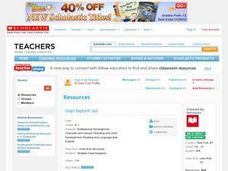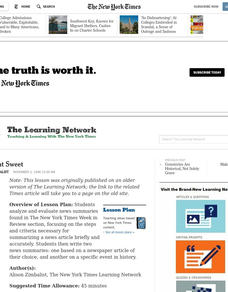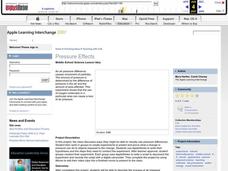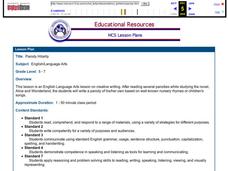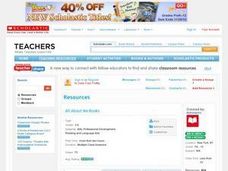Curated OER
The Process of Art Criticism
Students interpret possible meanings of works of art by analyzing how specific works are created and how they relate to historical and cultural contexts
Curated OER
Scientists Write!
Students use a journal to record observations. They make notes about what research may be needed to answer questions that have come up in the field and sketch or make connections in the curriculum. They research bioinformatics and...
Curated OER
Stop! Explore Go!
Students examine a three-step process for making decisions and how their peers can influence them in different ways. They role-play different roles when making decisions and other students reflect on how they feel about the activity.
Annenberg Foundation
Service Learning in the Social Studies
Active Citizenship Today (ACT) is a "unique social studies service learning program" that requires students to learn about the public policy associated with community issues they identify in their local community. This web site provides...
Curated OER
Let the Campaign Begin
Students examine the many steps involved in the electoral process. They examine past president's campaigns and write an announcement speech for the candidate of their choice.
Curated OER
Short But Sweet
After analyzing and evaluating news summaries found in the New York Times "Week in Review" section, middle schoolers study the steps for summarizing a news article briefly and accurately. They write two news summaries: one on a newspaper...
Curated OER
Pressure Effects
Students, in groups, create experiments to predict and prove what a change in pressure can do to objects exposed to the change. They use AppleWorks to write their hypotheses and the steps they need to conduct the experiment.
Curated OER
Great Expectations: DRTA Strategy
A Directed Reading Thinking Activity (DRTA) strategy for Great Expectations scaffolds and guides readers as they begin Dicken's novel. Step-by-step directions are provided, as are chapter one pair-share questions, a prediction worksheet,...
National History Day
Helping Life and Aiding Death: Science, Technology, and Engineering at Work during World War I
Science, engineering, and United States history? Pupils research collections of artifacts from the Smithsonian to learn about historical scientific innovations. At the end of the lesson, they write an essay to discuss technology's...
Curated OER
QAR: Question Answer Relationships Strategy: The Catcher in the Rye
Encourage readers to think deeply about text with a reading strategy that promotes active comprehension. Individuals develop questions on four levels (right there, think and search, author and you, and on my own). Step-by-step directions...
Film English
If At First You Don't Succeed
When faced with a challenge, how do your pupils respond? Starting with character analyses, learners participate in a lesson about appearances and perseverance. They watch a short film, talk about common English expressions, and write a...
Curated OER
Five Paragraph Essay
Students create a standard outline, using a word processing tool, while they are learning about the basic writing device of the 5 paragraph essay.
Curated OER
Parody Hilarity
Upper grade and middle school writers study the art of parody. In this language arts lesson plan, learners study the work of Lewis Carroll, read and discuss parodies from the book, Alice in Wonderland, and construct their own parody...
Curated OER
Poetry In Motion
Fourth graders read and analyze poetry and examine the process of writing poetry. They read and analyze the poem "From a Railway Carriage" by Robert Louis Stevenson, and answer comprehension questions. They identify the similes,...
Curated OER
Erosion
Young scientists identify erosion, explain the causes of erosion, and name some techniques that can slow the process of erosion. Learners are divided up into groups of four and perform a simulation of soil erosion in class. The...
Curated OER
All About Me Books
Students examine literature of emergent readers, categorize books into types of literature common for primary readers (wordless, pattern, alphabet, number, rhyme, etc.), and write a book about themselves to give as gifts to their new...
Curated OER
Pigs Don't Wear Pants
Students engage in the writing process and differentiate between what is real versus fantasy. They identify the rhyming words and follow the steps of writing to complete the page for the class book. The prompt is checked looking for...
Curated OER
Reviewing Language
Eighth graders examine some of the basics of the writing process in order to improve long-term writing goals. They apply the concepts of using speech, prefixes, and suffixes. Students use and describe the different steps of the writing...
Curated OER
Creating a Newspaper
Middle schoolers facilitate to comprehend the importance of newspapers in today's world. They facilitate to assemble the components of a newspaper. Students use the steps of the writing process to publish a newspaper.
EngageNY
Estimating Digits in a Quotient
Boiling down any division problem to a one-digit divisor problem sure makes estimation easy. The lesson shows how to estimate division problems by using place value understanding and basic arithmetic facts to simplify the division. Some...
Curated OER
I'm a Changed Pig - Personal Narrative
Young writers explore character arcs, conflict, and narrative in this complete and ready-to-use lesson plan from Scholastic. As a class read The Three Little Wolves and the Big Bad Pig and discuss the dramatic change the pig undergoes...
iCivics
No Rambling Allowed
What makes for a strong persuasive argument? Organization! After deconstructing a sample argument and then following the guidelines of an included worksheet, your class members will learn how evidence can be organized in order to produce...
Curated OER
Monster Descriptions
Monsters take center stage! Elementary schoolers are assigned to write a descriptive paragraph by a toy company to help in designing a new monster for their toy line. One student composes the paragraph, another uses that to create a...
Curated OER
The Pearl: Found Poem
It's hard to beat the beauty of John Steinbeck's prose, so borrow a little of it to form your own found poetry. After kids finish Chapter One of The Pearl, they select the most evocative and vivid words to create found poems.




